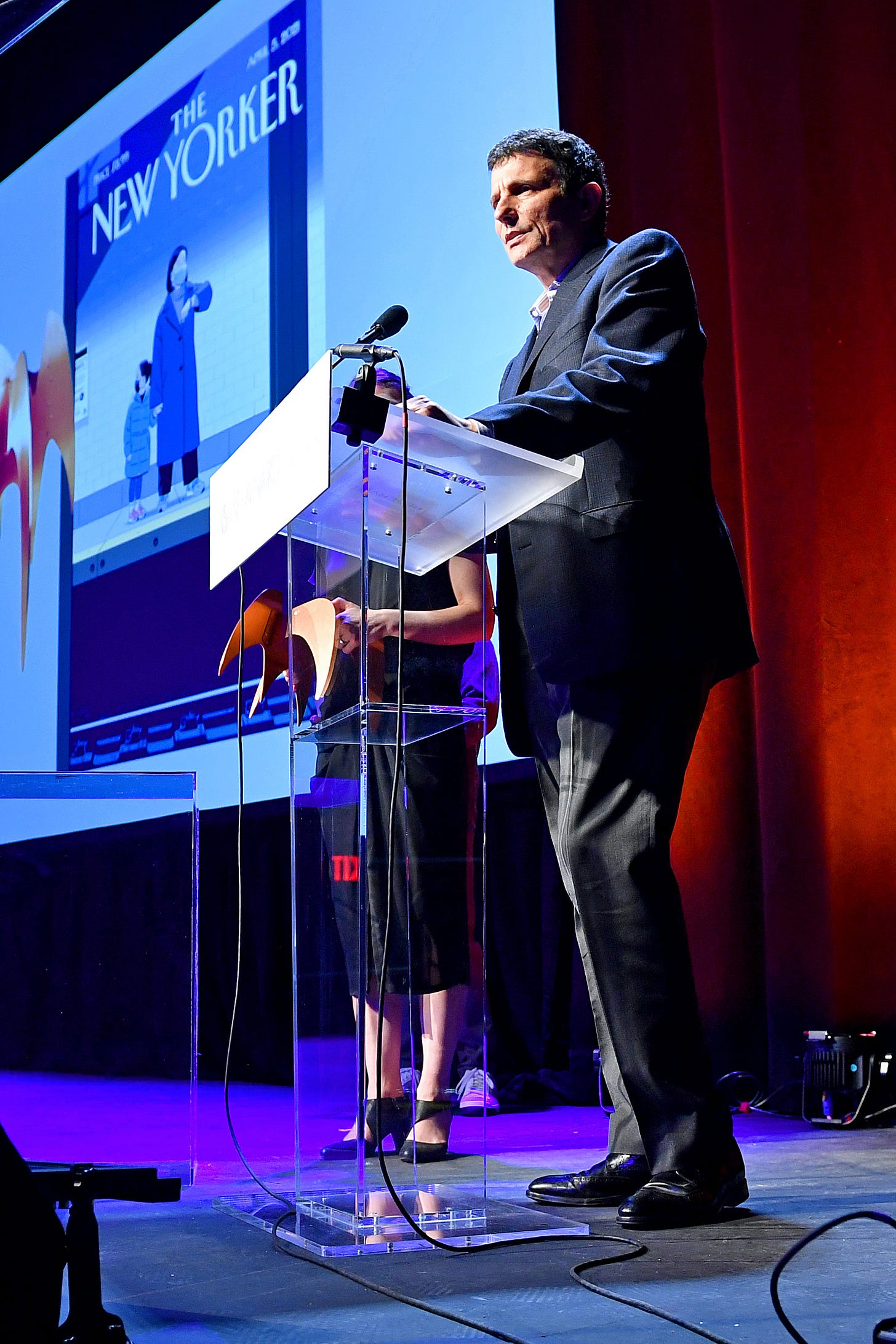Cutting it as a tech writer
The media industry is a raging wildfire. How to make it as a writer in the 2020s.
Another week, another media blow-up. Yesterday, an editor at The New Yorker, Erin Overbey, accused the magazine of retaliating against her for protesting alleged gender inequalities at the office, when it opened a “performance review” into her work. She claimed her boss, editor-in-chief David Remnick, inserted two errors into her articles during the performance review, potentially sabotaging her job at the worst possible time.
(The New Yorker called Overbey’s accusation against Remnick “absurd.”)
David Remnick. Courtesy of Getty Images, used under a license.
Public tiffs, firings and flare-ups on social media have become cinema at some of America’s largest newspapers and magazines. These are symptoms of a declining industry, in which falling pay, longer hours, and the never-ending fear of losing one’s job don’t align with the high ideals of equality, justice and democracy that our media institutions espouse in public. The result is the occasional staff insurrection.
I started as a tech writer in 2008. That year, the double punch of the Great Recession and digital disruption was carnage for the traditional media ecosystem. The New York Times came close to bankruptcy in 2009. Online-only outlets, like BuzzFeed and The Huffington Post, experimented with new funding models, with mixed results.
Sadly, no business structure has succeeded at restoring the media’s pre-internet glory. The biggest news websites continue to lay off their loss-making journalism employees while expanding their cat video and listicle businesses. The transformation that kicked off more than a decade ago is here to stay.
This week, a few aspiring tech writers asked me how they can “make it” in the chaotic media industry. It’s still possible. But you’ll need to rethink what it means to be a writer and how you can make your contribution. Here are takeaways from my career:
Articulate your beat. The days are gone when you can join a newspaper out of college, write general news, and expect that your job will exist in five years. You need to be able to survive as an independent writer with a brand. The audience needs to know your beat, prose, interests, what you’re all about—and why you’re the one to tell the story.
Choose a relevant, topical beat and explain it in 30 seconds or less. Pretend you’re pitching your work to a book publisher or website. “I cover the transformations happening in Web3 tech culture after the decline of Silicon Valley. My essays and books combine journalism, colorful profiles and social and cultural commentary.”
You can’t be just a writer anymore. We’re awash in free content, and so selling your work is tough if you have no built-in audience. As you bring in more paychecks, be sure to hire a speakers’ bureau, a literary agent, a publicist, and a freelance editor. Give talks at corporate campuses. Appear as a commentator on the news. Start a YouTube channel. You need to become the go-to person across a media spectrum, with appeal to a paying viewership.
Fill in a growing space. “I’d rather be an art writer. I want to review museum exhibits.” I hear this all the time. If you don’t care about earning a living from your work, become a critic. The shrinking arts beats have been hit so hard that they’ve become the preserve of unpaid newsletter writers and amateur creators.
If you want a comfortable career, pin down a growing story and tell it in a compelling, coherent way. Many tech writers have built stellar careers covering Apple, Google or a single company. Others excel at covering a particular industry, a tech subculture, or a political problem. Readers either want to know or need to know about certain topics.
Treat writing as a business. The “starving artist” is a trope and a myth. Many successful artists have money in the bank and can think like entrepreneurs. Manage your finances carefully and take risks when necessary. Learn how to negotiate a contract, set your compensation, and keep film and adaptation rights for your work.
If a project doesn’t show promise financially, step back and reconsider your approach. There’s no sense going bankrupt hoping you’ll write the next Great American Novel. In all likelihood, you will sell fewer than 1000 copies and earn a middling advance, if it gets published at all.
Write about your passion, but don’t forget the fundamentals. “First I will master this, and then the creativity will come,” is a Japanese saying. If you write every day, pitch to editors, work towards your book, and promote your writing online, you’ll refine your fundamentals and build a long-term career.
Once you’re established, you’ll have more freedom to pursue your passions. Want to revisit your novel? Write about a subject you love, but never had the time for? Now you have the resume, craftsmanship and network that will help sell your work to an agent and publisher.



Great advice
Thanks
Careful . . . You'll make enemies with such common sense.